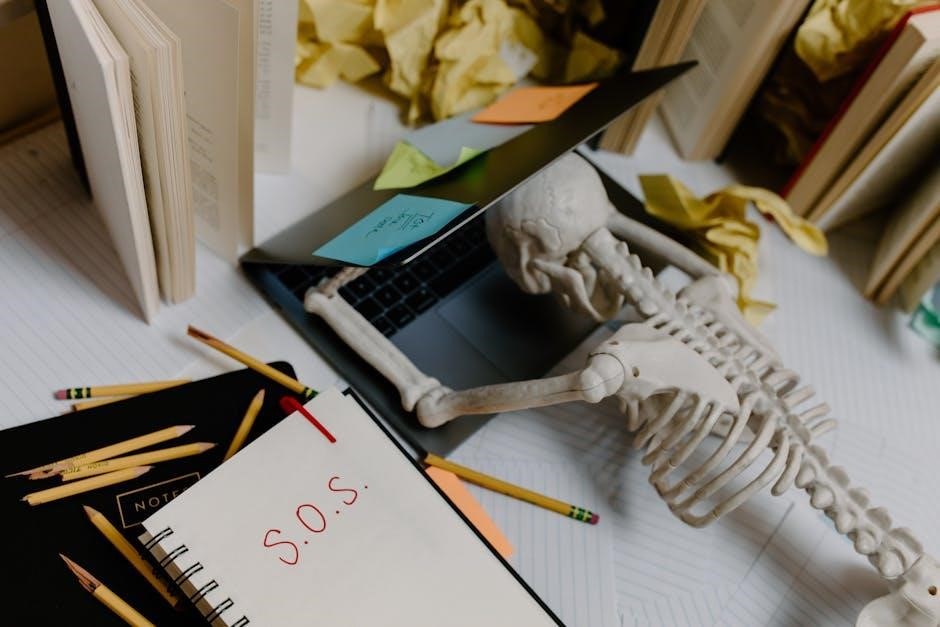The New York State Notary Public Exam is essential for certification․ The official guide offers comprehensive resources, covering state laws and procedures for thorough preparation and success․
1․1 Overview of the Exam
The New York State Notary Public Exam is a 40-question multiple-choice test assessing knowledge of notary laws, practices, and responsibilities․ Administered by the Department of State, it requires a 70% score to pass․ The exam is a critical step for those seeking to become a licensed notary public in New York, ensuring they understand the legal and ethical duties of the role․ Proper preparation is essential for success․
1․2 Importance of the Exam
The New York State Notary Public Exam ensures candidates understand legal standards and ethical practices․ Passing it validates their ability to perform notarial duties accurately, maintaining public trust and upholding legal integrity․ It is a mandatory step for obtaining a notary commission, enabling individuals to legally witness documents and execute official duties within the state․

Exam Format and Structure
The exam consists of 40 multiple-choice questions, requiring a 70% score to pass․ Candidates have 60 minutes to complete it, ensuring a thorough assessment of notary knowledge and skills․
2․1 Number of Questions and Time Limit
The New York State Notary Public Exam includes 40 multiple-choice questions, and candidates have 60 minutes to complete it․ This format ensures a fair assessment of knowledge while allowing sufficient time for thoughtful responses․ Scoring requires 28 correct answers (70%) to pass, making preparation essential for success in this timed examination․
2․2 Question Type and Scoring
The exam features 40 multiple-choice questions, focusing on notary laws, ethics, and procedural requirements․ Each question is designed to test knowledge of New York State notary regulations․ Candidates must answer at least 28 questions correctly (70%) to pass․ The scoring system ensures a clear and objective evaluation of a candidate’s understanding of notary duties and legal responsibilities, making it a fair assessment of readiness to serve as a notary public․

Official Study Materials
The New York State Notary Public Manual is the primary official resource, offering detailed insights into notary laws and procedures․ It’s available for free on the Department of State website, ensuring candidates have access to accurate and up-to-date information for exam preparation․
3․1 New York State Notary Public Manual
The New York State Notary Public Manual is the primary official study resource, available for free on the Department of State website․ It provides detailed insights into New York notary law, procedures, and ethical practices․ The manual includes essential information on notarial duties, fee charts, and legal requirements, making it a critical resource for exam preparation․ Regular updates ensure it reflects the latest legislative changes․
3․2 Additional Resources from the Department of State
Beyond the manual, the Department of State offers additional free resources, including practice exams, online courses, and video guides․ These tools complement the manual by providing interactive learning experiences․ They cover key exam topics, such as notary laws, fee charts, and ethical practices․ These resources are accessible online, ensuring candidates have comprehensive materials to prepare effectively for the New York State Notary Public Exam․
Free Study Resources
Free study resources, such as practice exams and online guides, are available to help candidates prepare for the New York State Notary Public Exam․ These tools provide valuable insights and practical exercises to enhance exam readiness․
4․1 Free Practice Exams and Questions
Free practice exams and questions are readily available online, offering candidates the opportunity to assess their knowledge․ These resources simulate the actual exam format, covering topics like notary laws, procedures, and ethical practices․ They include sample questions, answer keys, and explanations to enhance understanding․ Utilizing these tools helps candidates identify weaknesses and improve their readiness for the official New York State Notary Public Exam․
4․2 Online Courses and Video Guides
Free online courses and video guides are excellent supplementary resources for exam preparation․ Platforms offer structured lessons covering notary laws, procedures, and best practices․ Video guides provide visual explanations of complex topics, while interactive courses allow for self-paced learning․ These tools enhance understanding and retention, ensuring candidates are well-prepared for the New York State Notary Public Exam and its specific requirements․
Eligibility Requirements
To become a New York State Notary Public, applicants must meet specific eligibility criteria, including age, residency, and legal requirements․ The process ensures only qualified individuals are commissioned to serve as notaries public in the state․
5․1 Basic Qualifications
To qualify for the New York State Notary Public Exam, applicants must be at least 18 years old, a U․S․ citizen, and a New York State resident․ Non-residents with a business or office in the state may also apply․ Additionally, candidates must not have a felony conviction and are required to submit a $7,500 surety bond as part of the licensing process․ The application must be completed accurately and submitted to the Department of State․
5․2 Special Considerations for Non-Residents
Non-residents may apply if they maintain a business or office in New York State․ They must meet the same basic qualifications as residents, including U․S․ citizenship and no felony convictions․ Non-residents must also secure a $7,500 surety bond and will be commissioned for four years․ Their notarizations must comply with New York State laws, even when performing duties outside the state․
Exam Administration
The New York State Notary Public Exam is administered by the Division of Licensing Services within the Department of State․ The exam is a 60-minute, 40-question multiple-choice test based on New York Notary License Law․
6․1 Administering Authority
The New York State Notary Public Exam is administered by the Division of Licensing Services (DLS) within the Department of State․ DLS oversees the licensure, registration, and regulation of notaries public, ensuring compliance with state laws and professional standards․ They are responsible for scheduling, conducting, and scoring the exam, as well as maintaining records of notary public commissions․
6․2 Exam Scheduling and Locations
The New York State Notary Public Exam is offered at various locations across the state, including major cities like Albany, Buffalo, and New York City․ Exams are scheduled regularly, typically weekly or bi-weekly, and can be booked through the Division of Licensing Services (DLS)․ Candidates must register in advance, as space is limited․ The exam is 60 minutes long, and applicants are encouraged to arrive early to complete check-in procedures․
Test-Taking Strategies
Effective test-taking strategies include managing time efficiently, thoroughly understanding question types, and staying calm․ Practice with sample questions to build confidence and master the exam format․
7․1 Effective Study Techniques
Effective study techniques include focusing on the official New York State Notary Public Manual, utilizing free practice exams, and leveraging flashcards for key terms․ Prioritize understanding legal concepts and recent legislative changes․ Allocate time for regular review and practice, ensuring mastery of notary laws and procedures․ Engage with online video guides and community forums to clarify doubts and gain insights from experienced notaries․
7․2 Time Management During the Exam
Effective time management is crucial for the New York State Notary Public Exam․ Skim through all questions first to identify easier ones, then allocate about 1;5 minutes per question․ Avoid spending too long on a single question—mark it for review if unsure․ Use the remaining time to revisit unanswered questions and ensure all are attempted․ Stay focused and avoid distractions to maximize efficiency․

Common Mistakes to Avoid
Common mistakes include misunderstanding notary laws and poor time management․ Avoid these errors to ensure success on the New York State Notary Public Exam․
8․1 Misunderstanding Notary Laws
Misunderstanding New York State notary laws is a common mistake․ Ensure thorough knowledge of legal requirements, including fee structures, acceptable ID forms, and prohibited acts․ Many errors stem from incorrect interpretations of notarization procedures․ Always reference the official New York State Notary Public Manual for accurate information․ Failure to comply with laws can result in exam failure or legal consequences․ Stay vigilant and review key legal concepts regularly to avoid these pitfalls․
8․2 Time Management Errors
Poor time management is a frequent issue during the exam․ With 40 questions and a 60-minute limit, allocating about 1․5 minutes per question is crucial․ Rushing through questions or spending too long on one can lead to incomplete answers․ Practice exams help improve pacing․ Avoid leaving questions unanswered, as there’s no negative scoring․ Effective time management ensures all questions are addressed, maximizing scoring potential and reducing stress during the exam․ Plan your approach carefully to avoid this common pitfall․

Additional Resources for Preparation
Utilize free flashcards and online games to reinforce notary concepts․ Join community forums and study groups for collaborative learning and exam tips․ Enhance your preparation with video guides․
9․1 Flashcards and Games
Flashcards and interactive games are excellent tools for engaging study sessions․ They help reinforce key concepts, such as notary laws and procedures, in a memorable way․ Many free online platforms offer notary-specific flashcards and games, making it easier to study on-the-go․ These resources are particularly useful for visual and kinesthetic learners, as they break down complex topics into digestible pieces․ Additionally, they allow candidates to test their knowledge in a fun and competitive manner, ensuring better retention of essential information for the exam․ These tools complement traditional study materials and video guides, providing a well-rounded approach to preparation․
9․2 Community Forums and Study Groups
Community forums and study groups provide valuable support for exam preparation․ They allow candidates to share tips, ask questions, and gain insights from others preparing for the exam․ These platforms foster collaboration and accountability, helping to clarify doubts and stay motivated․ Many online forums are free to join, offering a wealth of shared resources and advice․ Engaging with peers can enhance understanding and confidence, making the study process more enjoyable and effective․
Understanding New York State Notary Laws
Understanding New York State Notary Laws is crucial․ Study the official manual for notarization procedures, ethical practices, and legal responsibilities․ Adhere to current legislation for compliance․
10․1 Key Legal Concepts
Key legal concepts for New York State Notary Laws include understanding authentication of documents, verification of identities, and administering oaths․ Notaries must adhere to ethical practices, maintain confidentiality, and avoid conflicts of interest․ Familiarity with state-specific regulations, such as prohibitions on notarizing documents for immediate family members, is essential․ These principles ensure compliance with legal standards and uphold the integrity of notarial acts in New York State․
10․2 Recent Changes in Legislation
Recent updates to New York State Notary Laws include expanded rules for electronic notarizations and remote notarizations․ These changes aim to modernize notarial practices while maintaining security and authenticity․ Additionally, there have been clarifications on acceptable forms of identification and enhanced penalties for non-compliance․ Staying informed about these updates is crucial for notaries to ensure they adhere to the latest legal requirements and maintain their commission effectively․
Licensing Process After Passing the Exam
After passing the exam, submit your application with the required fee to the NYS Department of State․ Upon approval, you receive a 4-year commission as a Notary Public․
11․1 Submitting the Application
After passing the exam, applicants must submit their notary public application to the New York State Department of State, Division of Licensing Services․ The application requires a fee, proof of exam results, and a background check․ Once approved, the commission is granted, valid for four years․ Non-residents with a business in New York are also eligible to apply․
11․2 Receiving the Commission
Upon approval, the New York Secretary of State grants the notary public commission, valid for four years․ Applicants receive a certificate, which must be filed with their county clerk․ A notary seal and journal are required for official duties․ Non-residents with a business in New York are also eligible for commission, ensuring they can legally perform notarial acts within the state․
